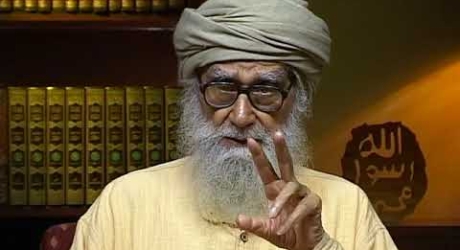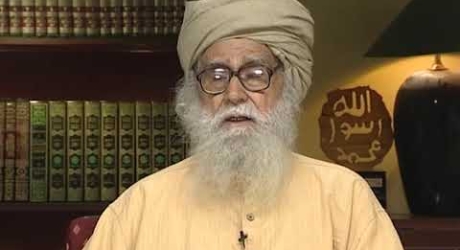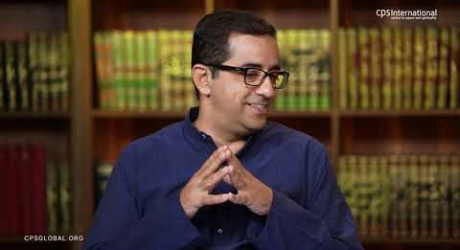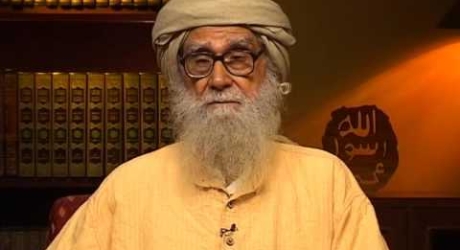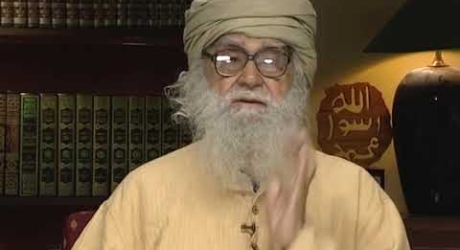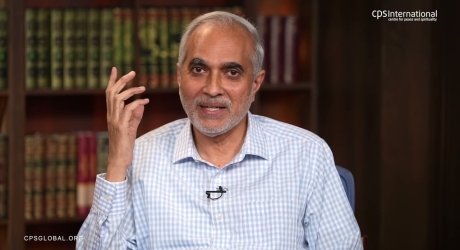The commands of fasting are given in Chapter 2 of the Quran. These verses are as follows:
“Believers, fasting has been prescribed for you, just as it was prescribed for those before you, so that you may guard yourselves against evil. Fast for a specified number of days, but if any one among you is ill or on a journey, let him fast the same number of days later. For those who can fast only with extreme difficulty, there is a way to compensate—the feeding of a needy person. But he who does good of his own accord shall be well rewarded; but to fast is better for you, if you only knew”.
“The month of Ramadan is the month when the Quran was sent down as guidance for mankind with clear proofs of guidance and the criterion by which to distinguish right from wrong. Therefore, whoever of you is present in that month, let him fast; but he who is ill or on a journey shal fast a similar number of days later on. God desires ease for you , not hardship. He desires you to fast the whole month, so that you may glorify Him for His having guided you and so that you may be grateful to Him”. (THE QURAN 2: 183 – 185)
Fasting is training with a dual purpose. One is thanksgiving, the other Taqwa (righteousness or piety).
Food and drink are two great blessings of God that are not well appreciated under normal conditions. Fasting the whole day, a person experiences great hunger and thirst. After sunset, as he eats and drinks, he truly appreciates how great these blessings of God are. Overwhelmed with this experience, he expresses his gratitude to God from the innermost recesses of his heart.
Introduction
Today is the fourth day of Ramadan, 1434 A.H. One aspect of this month of fasting pertains to its Do’s and Don’ts, which is not my subject of discussion because people are generally aware about it. I would like to elaborate on the wisdom inherent in the practice of fasting during the month of Ramadan. Chapter 2 of the Quran lays down the basic principles of fasting during Ramadan. According to a verse
“The month of Ramadan is the month when the Quran was sent down as guidance for mankind with clear proofs of guidance and the criterion by which to distinguish right from wrong.” (2:185)
The believers were enjoined to observe fasting from daybreak to sunset in the month when the Quran was revealed. Therefore there exists a special connection between Ramadan and Quran. Let us understand this connection.
The Arabic word for fasting is ‘sawm’ meaning abstinence (‘rukna’) or restraint from desires. The abstinence from food and water is symbolic of saving oneself from all kinds of distraction, including basic needs, for a temporary period of time. The main purpose of fasting is to go through the Quran with complete focus and dedication. This is a very serious study (mut-alaa). So, believers are required to keep away from all other activities, and concentrate their minds totally on the study of the Quran so that they are able to discover the deep meaning in the Quran. According to a Hadith
Quran ke mane kabhi khatam nahin honge (Mishkat)
The wonders of Quran shall never cease
Just as taking more and more water from an ocean does not dry it, similarly, continually reflecting on the Quran only allows its deeper meaning to unfold. Materialists think on the lines of “more and more money” but the mindset of a true Muslim should be “more and more wisdom from the Quran.” In other words if you dedicate the month of Ramadan to the study of Quran, you shall discover newer meanings. For instance the following verse of the Quran opens a whole new meaning to the reader
Believers, fasting has been prescribed for you, just as it was prescribed for those before you, so that you may guard yourselves against evil" (2:183)
This verse highlights that fasting is a universal practice and was a common element across religions. And ever since man inhabited Earth, Prophets were sent to guide him and they enjoined their community to observe fasts.
When man observes a fast today, he gets connected to a long history. I was gripped by the realisation of this thrilling idea that those who observe fasts in the month of Ramadan become a part of that divine chain which begins from the first pious person and ends with the last man of history!” The realisation that you have got connected with the list of those pious and God-fearing men who led a rightly guided life is an overwhelming experience!
Reading with an open mind
When a believer prepares himself and starts reading the Quran with an open mind, he finds himself before an unending sea of wisdom. Let us take the first verse of Quran.
In the name of God, the Most Gracious, the most Merciful
This verse teaches that the best way to begin any task is in the name of God, the Lord, the Being who is the source of all blessings and whose blessings and mercy are continually pouring upon His creation. To commence any undertaking in His name is to pray that God, in His infinite mercy, should come to one’s assistance and bring one’s work to a successful conclusion. This is man’s acknowledgement of the fact that he is God’s servant and also brings divine assurance of success. This belief inculcates in man an unlimited conviction that he is about to begin his work in a world that is controlled by an All-Powerful and All-Merciful God! The trait of being Merciful and Beneficent binds God to send His succour to His creation at all times! The very first verse therefore becomes the source of such a significant realisation! And the same is true for the entire Quran.
The month of Ramadan is the month of introspection – to evaluate the past, discover the present and plan the future. If Muslims read the Quran with an open mind, they would undoubtedly find guidance for themselves. For instance, a study of the Quran will bring the reader to the following verse,
“Whatever misfortune befalls you is of your own doing.” (42:30)
If the reader is earnest and reads this verse with an open mind, he will apply it to his own life and to the life of the Muslim ummah. By doing so he will discover that anything which Muslims have suffered in the past was not due to anti-Muslim forces, rather it was entirely Muslims’ own mistakes. This will build the mindset of seeking the reason of the problem within and to correct it. This discovery will produce brainstorming in the mind of the reader and he will decide with complete determination to convey this fact to the entire Muslim ummah!
Further during the study of the Quran, the believer reaches this verse:
“God alters not what is with a people, until they alter what is within them.” (13:11)
If the believer is sincere in the true sense of the word, this Quranic verse is bound to make a deep impression on his mind. He will find the proper line of action for the future. He will decide that we have to completely abandon the language of complaint and protest against others because, according to the divine law, that will not work. He will have to bring about reform in his life. This is the precondition enshrined in the Quran. If he wants his present to change, we he will have to work to remove his shortcomings. If he fulfils this condition, he will be able to receive divine guidance and support, which is a guarantee of all kinds of success.
Ramadan: month of Aetkaaf
In the month of Ramadan, people spend last ten days in Aetkaaf (worship in seclusion). But in reality, Ramadan is a month of Aetkaaf because a believer’s mind is busy thinking about the learning from the Quran. Whether he reads the Quran in morning or evening, while walking or sitting, his mind will keep reflecting upon the verses. So while last ten days become formal Aetkaaf, the first twenty days are informal Aetkaaf. In this manner, the entire month is the month to seek guidance and mercy from God!
Ramadan is not only about abstaining from food and water from daybreak to sunset. This is the form of Roza but what is the purpose of this annual practice? The purpose is to save oneself from all forms of distraction and devote ourselves to the study of Quran. Quran implores man to contemplate on its verses (Tadabbur) and according to a verse
When My servants ask you about Me, say that I am near. I respond to the call of one who calls, whenever he calls to Me: let them, then, respond to Me, and believe in Me, so that they may be rightly guided. (2:186)
Thinking about this verse, I realized that to contemplate on Quran is similar to contemplating and studying in the divine library. One learns new things in a library and likewise when one reflects on the Quran with dedication and an earnestness to comprehend its wisdom, it makes one eligible for receiving divine inspiration. In other words, Tadabbur is similar to studying in the divine library and comprehending the unfolding of newer facets. It becomes a means of growing the intellect.
Among the verses where fasting has been made obligatory for man, it is said
For those who can fast only with extreme difficulty, there is a way to compensate – the feeding of a needy person. (2:184)
In other words, those who become medically unfit to observe fasts must help the poor and give fidiya. Quran has other verses about fidiya or sadaqa. For example, a verse reads,
And those who give to others what has been bestowed upon them with their hearts trembling at the thought that they must return to their Lord. (23:60)
So while it is the hand that offers, it is the heart that trembles! And for a believer who owing to a medical reason is not able to observe fasts and gives fidiya, it does not remain as a mere act of giving, his heart trembles and a tempest of thoughts arise in his mind!
I therefore realised that one is physical fasting and another is spiritual fasting. While a believer is not able to observe a physical fast, he can still observe a spiritual fast. This can be understood from the following instance that took place at the time of Prophet. During the Battle of Tabuk, some of the companions of the Prophet, who were very keen to take part in this sacred jihad came and requested him to provide them facilities for the journey. When the Prophet told them that he did not possess any animal for riding which he might place at their disposal, they wept bitterly and tears trickled down their faces. They went back grief-stricken and prayed for all those who went with the Prophet. Quran makes a mention of these people in the following words:
Nor [does any blame] attach to those who came to you to be provided with mounts, and when you said, ‘I can find no mounts for you,’ they went back, and tears welled up in their eyes with sadness, since they could not find any way to contribute. (9:92)
According to a tradition of the Prophet Muhammad: while returning from the Battle of Tabuk, he said to his companions, ‘There are certain people in Medina, about whom you may say that they have not trodden any path or that they have not traversed any valley but who were nevertheless shoulder to shoulder along with you.’ From this verse and the tradition, I understood that while some did physical Ghazwa, others did spiritual Ghazwa!
Likewise those who are not able to observe fast (because of being medically unfit) still have a hope! Though they are not able to observe physical fasting, they can still observe a spiritual fast by thinking about the reality of fasting, praying for those who are observing fast and contemplating on the Quran. In doing so, they will be entitled for a reward equivalent to those who perform physical fasting. I understood the meaning of a Hadith which refers to Ramadan. It is said about the roza,
Ramzaan woh mahina hai jab ki momin ka rizq badha diya jaata hai (Al Baihaqi)
It is the month in which the believer's provision is increased
People often construe this Hadith to mean and abundance of food and resources during the month of Ramadan. But this is a wrong interpretation. If a believer prays to God, will he merely desire more food and provisions? No. A believer would desire increase in his spirituality, wisdom, faith and God-realisation. And this is what is meant by this Hadith, that in the month of Ramadan both fear of God and love of God increase and a believer is able to increase his level of God-realisation.
Let us understand how the ‘provision’ of a believe is increased during Ramadan. When a believer is so keen to concentrate on understanding the Quran and reality of life that he temporarily abstains from food and water to keep away from all distractions, he is able to contemplate and reflect in a profound way. Whether he reads or thinks or performs any other act, the thoughts keep brewing in his mind and this constant process of thinking makes him decipher newer meanings. As a result of the special provision he undertakes to comprehend the Quran at a deeper level, a new personality emerges within him and he becomes a recipient of divine inspiration.
Drawing lessons from the Quran
During the month of Ramadan, a believer is required to contemplate on the Quran with complete dedication, introspect his past, recognise the mistakes committed and in the light of Quranic guidance, adopt the correct course of action and re-plan his future. Fasting in the month of Ramadan is like a spiritual rehearsal for every Muslim. If this annual practice is done in the true spirit, it is bound to revolutionise the condition of Muslims, both individually and collectively. It is a need of man to find such time where he can review the mistakes committed by him, seek pardon for his acts and plan for the right course of action. Doing this sincerely would allow man to course correct his life. While thinking this, I began reflecting over the situation in Egypt where Muslims are killing Muslims and in less than a year thousands of Muslims have been killed. It is said that Egyptians are proud of their special way of reciting the Quran.
It is famously said,
Quran utra Hijaz mein aur padha gaya Misr mein
[Quran was revelead in Hijaz bur recited in Egypt]
Unfortunately, this recitation was in words alone! If they would have sincerely reflected on its meaning, they would have realized that Quran has a verse which says
If anyone kills a believer deliberately, his reward shall be eternal Hell. (4:93)
This would have made the Egyptians cry out that those whom they killed were also Muslims and consequently they stand to earn Hellfire for themselves! Burdened by this realisation, they would have thrown away their arms and strived to establish peace. But they only ‘recite’ the Quran.
The purpose of Ramadan is not to abstain from food and water but to allow for a deep study of the Quran, free from all distractions. When an earnest believer does this, he is overwhelmed by the realisation he makes. Just as the above verse is sufficient to jolt out the Egyptians to think that until now they have been doing that which is against the Will of God!
The month of Ramadan invites a believer to think and realize what the Quran wants of him – what is expected of a believer and what must he refrain from! If Muslims do this every year, they would revolutionize their lives! Unfortunately, at the practical level, Muslims practice “Khatm-e-Quran.” They simply recite the Quran and finish it off in a haste! Reading the Quran does not become a source of realisation and neither they receive any food for thought! According to a Hadith, some people used to do this in Hazrat Ayesha’s time and when she was told about them she said
Unhone padha par unhone nahin padha (Musnad Ahmad)
They read the Quran but they did not read it.
This was because quickly reading and finishing the Quran is not desired of a believer. He is required to read, think and draw lessons from it. The Quran is like a divine mirror, in which Muslims can see their true face. They can identify the mistakes they have made in the past in order that they may mend their ways.
The reading of the Quran is supposed to incite new realisations so that a believer an apply the understanding he draws in his daily life. Present-day Muslims react ferociously on instances pertaining to Shatm-e-Rasool (disrespect of Prophet Muhammad) and create a lot of upheaval.
Ironically, nowhere does the Quran endorse this act of killing the one who disrespects the Prophet. According to the Quran, Muslims are told not to disrespect the deities of others lest they may retaliate.
Do not revile those [beings] whom they invoke instead of God, lest they, in their hostility revile God out of ignorance. (6:108)
If Muslims sincerely reflect on the Quran, they will be shaken to the core when they reach this verse which enjoins them to respond in a manner totally opposite to what they have been doing! If their mind is prepared to read, reflect and take guidance from the Quran and not simply finish it off, they will be able to derive much deeper meaning. It would arouse a tempest within them to think that while they propagated killing of whoever disrespected the, Quran does not prescribe reaction against those who may disrespect the Prophet. The Quran in fact, enjoins Muslims to refrain from indulging in any form of disrespect against others.
Muslims must recognise Ramadan as a month of introspection and not a source of mysterious piety. Whoever reflects sincerely on the Quran shall be rightly guided to clear up the blemishes in his life and plan his future to tread the right path and become worthy of paradise and divine blessings! This is what makes this month pious. The abundant provisioning refers to greater guidance that a believer learns by virtue of concentrated study and which guides him to lead a God-oriented life!
I pray that we are able to understand the importance of this month and plan our future by seeking guidance from the Quran!





